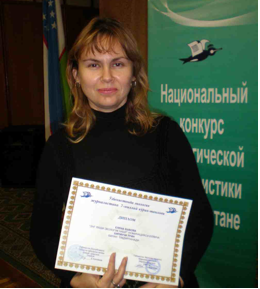Women Rising Radio Program XVIII: Activists for Wildlife
 ALICE NG: Alice Ng sees herself as both Chinese and American. Her parents immigrated to the US from China just after China’s cultural revolution. They were escaping hunger, and they wanted their children to achieve the American dream. Alice did just that, studying and working in IT and making a lot of money. But she chose to leave the corporate world to work on protecting the environment and animals. She had always felt great love for animals, and made a choice not to eat shark fin soup – a delicacy in Chinese cuisine – on account of her work with Wild Aid on shark conservation. That brought her into cultural conflict with her family, but she stood her ground. Then Alice found out about the work of Jill Robinson and her organization, Animals Asia. Jill was working with the Chinese government to rescue hundreds of Asian Moon Bears living in abject misery while their gall bladders were milked for the bear bile used in ancient Chinese medicine. Alice fell in love with the Moon Bears, and loved the work with Animals Asia, so she is now the US director for the organization. Animals Asia also works closely with the traditional medicine community in China to use alternatives to bear bile.
ALICE NG: Alice Ng sees herself as both Chinese and American. Her parents immigrated to the US from China just after China’s cultural revolution. They were escaping hunger, and they wanted their children to achieve the American dream. Alice did just that, studying and working in IT and making a lot of money. But she chose to leave the corporate world to work on protecting the environment and animals. She had always felt great love for animals, and made a choice not to eat shark fin soup – a delicacy in Chinese cuisine – on account of her work with Wild Aid on shark conservation. That brought her into cultural conflict with her family, but she stood her ground. Then Alice found out about the work of Jill Robinson and her organization, Animals Asia. Jill was working with the Chinese government to rescue hundreds of Asian Moon Bears living in abject misery while their gall bladders were milked for the bear bile used in ancient Chinese medicine. Alice fell in love with the Moon Bears, and loved the work with Animals Asia, so she is now the US director for the organization. Animals Asia also works closely with the traditional medicine community in China to use alternatives to bear bile.
 LORENA AGUILAR: Costa Rican Lorena Aguilar is an international advocate for the protection of nature. She’s a cultural ecologist and gender specialist with the International Union for the conservation of Nature, or IUCN. Lorena is also an international advisor to governments, universities, and other institutions on topipcs related to water, environmental health, and gender and community participation. She earned her Master’s degree in Anthropology, but more importantly her family owned a coffee plantation where her father made Lorena pick coffee every weekend. On vacations, she lived with the coffee workers, and came to know them well. “There are people who have no shoes but have big dreams, people who might have just a piece of bread but they will share it with you,” says Lorena. She’s worked on many programs incorporating the wisdom of indigenous people into conservation programs. In one of them she worked with Mexican women training them to become sea captains taking tourists out to view whales. The whales were protected and the women made a living. That story is in Lorena’s Women Rising Radio profile. Listen!
LORENA AGUILAR: Costa Rican Lorena Aguilar is an international advocate for the protection of nature. She’s a cultural ecologist and gender specialist with the International Union for the conservation of Nature, or IUCN. Lorena is also an international advisor to governments, universities, and other institutions on topipcs related to water, environmental health, and gender and community participation. She earned her Master’s degree in Anthropology, but more importantly her family owned a coffee plantation where her father made Lorena pick coffee every weekend. On vacations, she lived with the coffee workers, and came to know them well. “There are people who have no shoes but have big dreams, people who might have just a piece of bread but they will share it with you,” says Lorena. She’s worked on many programs incorporating the wisdom of indigenous people into conservation programs. In one of them she worked with Mexican women training them to become sea captains taking tourists out to view whales. The whales were protected and the women made a living. That story is in Lorena’s Women Rising Radio profile. Listen!
 ROSAMIRA GUILLEN: Growing up in the tropical Northern region of Colombia, Rosamira Guillen wandered with her family in the jungle near her town of Baranquilla. She loved the jungle, and the animals and people living there. The focus of her work is now that same tropical forest, the same people and animals. One little creature in particular, the Cotton Top Tamarin Monkey, lives only in that forest, and Rosamira is determined to save it from extinction. Rosamira had earned a degree in landscape architecture in the US, then returned to become executive director of the Baranquilla Zoo. Then she heard about Proyecto Titi and left the Zoo to join them in the jungle. Proyecto Titi is the conservation organization that works to protect Cotton Top Tamarin Monkeys. Rosamira and Proyecto Titi created the Eco-mochilla project with the jungle communities. They crochet grocery bags from recycled plastic, and Proyecto Titi sells their bags worldwide. They’ve recycled about 2 million plastic bags – earning good incomes for the women in the community. So the people stay away from cutting down and stripping the forest for money. Proyecto Titi is also experimenting with solar ovens for heat and light.
ROSAMIRA GUILLEN: Growing up in the tropical Northern region of Colombia, Rosamira Guillen wandered with her family in the jungle near her town of Baranquilla. She loved the jungle, and the animals and people living there. The focus of her work is now that same tropical forest, the same people and animals. One little creature in particular, the Cotton Top Tamarin Monkey, lives only in that forest, and Rosamira is determined to save it from extinction. Rosamira had earned a degree in landscape architecture in the US, then returned to become executive director of the Baranquilla Zoo. Then she heard about Proyecto Titi and left the Zoo to join them in the jungle. Proyecto Titi is the conservation organization that works to protect Cotton Top Tamarin Monkeys. Rosamira and Proyecto Titi created the Eco-mochilla project with the jungle communities. They crochet grocery bags from recycled plastic, and Proyecto Titi sells their bags worldwide. They’ve recycled about 2 million plastic bags – earning good incomes for the women in the community. So the people stay away from cutting down and stripping the forest for money. Proyecto Titi is also experimenting with solar ovens for heat and light.
 ELENA BYKOVA: Wandering out on the steppes of Uzbekistan is a creature that looks like someone out of a Dr. Seuss book. Its face is indescribable, you just have to see it to believe it…it is the Saiga Antelope. This animal has a strong friend and advocate in Elena Bykova, a Russian scientist working to bring ecology and economics into harmony to renew and save the Saiga. Elena fell in love with both the Saiga and the steppes of Uzbekistan, rolling desert and grasslands. She works with the Saiga Conservation Association to teach Uzbeks how to prosper without harming the Saiga. SCA organizes in the schools of Uzbekistan, working with teachers, parents and students. They inculcate love and respect for the Saiga. And Elena also works to bring creative and sustainable incomes to the people of the steppe – to end the poaching of Saiga for their horns, which are considered valuable in Asian medicine.
ELENA BYKOVA: Wandering out on the steppes of Uzbekistan is a creature that looks like someone out of a Dr. Seuss book. Its face is indescribable, you just have to see it to believe it…it is the Saiga Antelope. This animal has a strong friend and advocate in Elena Bykova, a Russian scientist working to bring ecology and economics into harmony to renew and save the Saiga. Elena fell in love with both the Saiga and the steppes of Uzbekistan, rolling desert and grasslands. She works with the Saiga Conservation Association to teach Uzbeks how to prosper without harming the Saiga. SCA organizes in the schools of Uzbekistan, working with teachers, parents and students. They inculcate love and respect for the Saiga. And Elena also works to bring creative and sustainable incomes to the people of the steppe – to end the poaching of Saiga for their horns, which are considered valuable in Asian medicine.

